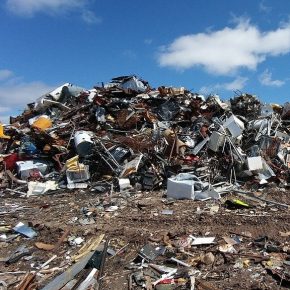
GUEST ARTICLE: The Importance of Recycling in Construction
The construction sector is one of the largest consumers of materials and, as a result, produces millions of tonnes of waste each year. And a staggering amount of this waste is sent to landfill, which has a negative impact on the environment, contaminating habitats and waterways.
From concrete, metals and asphalt to wood, glass, paper and plastics, this sector produces waste from a number of materials that are recyclable. There’s plenty of scope, then, for construction businesses to change their practices to reduce waste through recycling.
The environmental benefits
There are two key environmental benefits to recycling construction waste materials – not only does it reduce the amount of waste heading to landfills, but it also saves energy. With landfills filling up at an incredibly rapid rate, businesses in all sectors need to find ways to manage waste more efficiently.
Recycling waste enables it to be used in other ways, such as turning it into construction materials again or transformed into something else entirely. It also reduces energy requirements as it requires fewer natural resources than producing new materials.
Cost-saving opportunities
Reusing construction materials minimises disposal and transportation costs, as well as lowering the demand for new resources. In fact, construction companies that recycle materials gain a competitive edge due to the rising importance of environmental conservation and green building practices.

Businesses who choose to recycle save on disposal and landfill fees, along with reducing the need to purchase new materials, which reduces expenditure and helps the company’s bottom line. Using recycled materials in construction provides an improved customer perception too, which can help improve client acquisition and secure new business opportunities.
The opportunity for innovation
Through recycling materials, construction businesses have an opportunity to do good through innovation. There are countless avenues that companies in this sector can go down to address their waste production, from creating kerbs out of recycling plastic instead of concrete to using food matter as a building material to divert away from the fact that the industry accounts for 39% of CO2 emissions, 11% of which is from the manufacture of building materials. By working with other industries, the construction sector can combat waste collectively with other organisations too.
Contractors using innovation to combat the issue of waste through recycling can help save thousands of tonnes of plastic and other materials from entering landfills and reduce millions of kgs of carbon from entering the atmosphere. But switching to recycled building materials, such as those made from recycled plastic for example, can also help workers. Recycled plastic is lighter and doesn’t require heavy machinery, which is beneficial to the safety of construction workers, plus they don’t have the airborne risks that come from the likes of bricks, concrete and mortar which emit damaging carcinogens.
How can construction businesses adapt to eco processes?
There are several ways businesses in this sector can manage their waste more effectively, both through minimising it in the first instance but also recycling more. Efficient material usage limits the amount of waste generated long before waste contractors need to get involved.
The first step is to outline the goals the company wants to achieve within its updated waste management process, which should be reviewed regularly to identify missed opportunities and areas for improvement. In the long-term, businesses can use KPIs to ensure best practices are followed on-site and that feedback is taken on board from employees.
Final thoughts
The construction sector is responsible for a huge percentage of waste in landfills, but with better recycling processes in place, it’s possible to reduce this. And there are many benefits for the planet and businesses alike in doing so. From saving money through lower transportation and disposal costs and boosting brand image to minimising your carbon emissions, recycling construction materials can do more than just helping the environment.
Latest news

26th July 2024
Enfield Speciality Doors completes world-class project for Atlas Copco HQ
A rundown office and warehouse building completely transformed into a modern headquarters for Atlas Copco has been fitted with more than 120 internal fire doors from Enfield Speciality Doors.
Posted in Access Control & Door Entry Systems, Articles, Building Industry News, Building Products & Structures, Building Systems, Case Studies, Doors, Interior Design & Construction, Interiors, Posts, Restoration & Refurbishment, Retrofit & Renovation, Security and Fire Protection, Sustainability & Energy Efficiency, Timber Buildings and Timber Products, Wooden products
26th July 2024
Abloy UK launches new white paper
Abloy UK, a leading provider of security and access control solutions, has launched a new white paper.
Posted in Access Control & Door Entry Systems, Architectural Ironmongery, Articles, Building Industry News, Building Products & Structures, Building Services, Doors, Facility Management & Building Services, Health & Safety, Information Technology, Innovations & New Products, Publications, Research & Materials Testing, Security and Fire Protection
26th July 2024
MCRMA Member Profile: David Roy, Director of Roofconsult
David Roy of MCRMA member company Roofconsult has more than 50 years’ experience to draw upon working in the building envelope sector and a unique perspective on how it has changed in that time.
Posted in Articles, BIM, Infrastructure & CAD Software, Building Associations & Institutes, Building Industry News, Building Products & Structures, Building Services, Building Systems, Cladding, Information Technology, Restoration & Refurbishment, Retrofit & Renovation, Roofs, Walls
26th July 2024
Strand: Enhancing Door Functionality and Safety
Craig Fox, Sales Director for Strand Hardware, outlines how door industry professionals might apply door limiting stays…
Posted in Architectural Ironmongery, Articles, Building Industry News, Building Products & Structures, Building Services, Doors, Facility Management & Building Services, Health & Safety, Restoration & Refurbishment, Retrofit & Renovation
 Sign up:
Sign up: